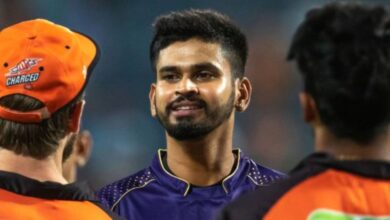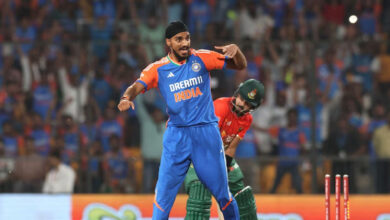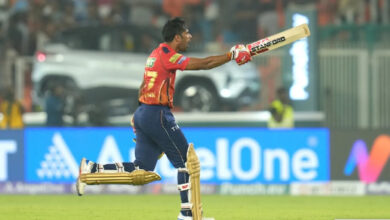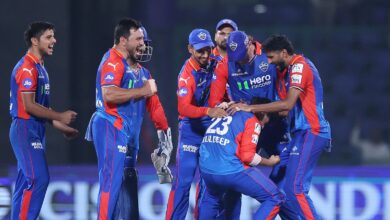Len Watch Read: West Indian rebels who believed they had a cause (apart from money)

Sport in the multiverse works in different dimensions, beyond Live Action. It is heard and seen and pored over in retellings wordsmiths. The Express Sports team picks out the best podcasts, docus, OTT series and book recommendations for sports lovers, every week in LWR – Len Watch Read
Branded a rebelYouTube: 51 minutes and 10 seconds
Former West Indies captain Clive Lloyd says he would have got paid up to a million dollars in the late 1980s to join the rebel tour to South Africa. “I would have been a very rich guy. I just didn’t want to and I couldn’t and I am proud of who I am, my colour… I think everybody should be proud of who they are. Apartheid is a system that should not happen anywhere in the world… and all the money in the world could not get me there,” Lloyd says.
Not everyone had unwavering principles like the two-time World Cup-winning captain and some of the players who went on the rebel tour had a different take. They somehow believed that going to South Africa in 1983, they would make a difference showing that black people could compete with a White team in the heart of apartheid South Africa.
But the taint of what Viv Richards called ‘blood money’ stuck with them for the rest of their lives.
The South African Cricket Union had hosted the rebel tours of England and Sri Lanka but now wanted the stars of world cricket to play on their home soil. Joe Pamensky, the then president of the South African Cricket Union, clearly says the inducement was money. “We made an offer, candidly, that they could not refuse,” Pamensky says, lifting a line made famous Marlon Brando in the Godfather.
Those who took the offer perhaps didn’t realise that they would be ostracised for the rest of their lives on return to the Caribbean.
The example of Jamaica’s star batsman Lawrence Rowe is a reminder of how much the rebel tour hurt the fans back home. In 2011, a stand at Sabina Park was named after Rowe. But such was the backlash that his name was removed and the decision reversed.
Rowe moved to the United States post the rebel tour.
Those who decided to travel to South Africa also had their moments of indecisiveness. Two players wanted to get off the plane just before it took off. But it was too late. Till the day they reached the airport to fly to Miami, before taking the connecting flight, the players denied they were travelling to South Africa.
There is footage of Collis King, the hero of the 1979 World Cup final against England – he had made 86 off 66 when the Windies were in trouble of 99 for 4 – being abused fans as he hides his face behind a hat.
The negotiations between the players and the South African Cricket Union took months and with cricketers like Lloyd and some of the regulars unwilling to travel, a second set of players had to be convinced.
“I made the decision because I wasn’t getting treated right as far as West Indies cricket. I was still scoring runs, but I wasn’t in the team…” King justifies.
Wicketkeeper David Murray, who drifted to drug addiction, feels him going on the rebel tour got more attention than the others.
For the money they got (estimated to be approximately $100,000 to $ 150,000), the players were putting on the line not only their reputation but their future. Even getting a visa to enter a country was going to be tough for these rebels.
“We arranged with the department of internal affairs that their passports wouldn’t be stamped to indicate they have been to visit South Africa, because it was a problem for them internationally,” Pamensky says.
The 18 players who were guests in South Africa, also got special status. They were given the title of ‘honorary whites’ which gave them access to every place black people in South Africa were barred from – for example, beaches.
This, however, didn’t help fast bowler Colin Croft. He was taken off a train for venturing into a white-only compartment. The ‘honorary whites’ status only added to the resentment back home which was growing with each passing day the players spend in South Africa.
“We were disappointed in what they did because I don’t think they were going to make a difference. They were going for the money. But don’t tell me you are going to change the apartheid system,” Llyod says.
The rebels were slapped with a life ban, which even Llyod calls a bit harsh. The ban was lifted in 1989, but most of these players were past their prime.
The film contains interviews with all-rounder Franklyn Stephenson, Murray, King and with Graeme Pollock and Clive Rice giving the South African perspective.
Some of the rebel cricketers managed to put their life together post the tour. Franklyn Stephenson started an academy and is a golf instructor in Barbados. Stephenson never played for the West Indies, though he was one of the most skilful pacers. A framed picture of the rebel team takes the pride of place at the academy and Stephenson treasures the blazer. He also comes up with a peppy jingle about the tour and seems to be in a happy place. “I will tell you of a cricket match and the men who played in Johannesburg in 1983…”
Journal Al Gilkes who covered the tour says he saw the men as ‘missionaries’ rather than ‘mercenaries,’ a minority opinion even after nearly 40 years of the tour.







